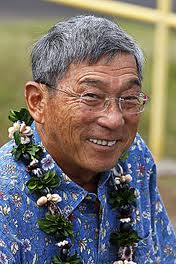The Next Big Island Mayor
There are no amateurs among this year’s top three mayoral contenders.
Set to face off in the Aug. 11 primary election are Mayor Billy Kenoi, Hawaii County Council chairman Dominic Yagong, and former mayor Harry Kim.
Should any one of those candidates receive more than 50% of the votes cast, they will secure the job of leading Hawaii County for the next four years. If no candidate hits that mark, the top two contenders will face off during the general election on Nov. 6.
All three men have ample experience in high ranking county posts, but have different visions for the future of the Big Island.
Kenoi: Well-Financed Incumbent, Focused on Maintaining Services
Having raised over $90,000 in the first six months of the year, the current mayor brought in more than six times the amount of cash than Yagong. Kenoi also raked in more donations than Harry Kim, out-fundraising the former mayor roughly 68 times over.
With strong union support, Kenoi has focused on preserving county services, despite the fact that property values have declined throughout his first term in office.
By not filling vacant positions, implementing furloughs, and putting off over $34 million in payments to a retiree benefit account, Kenoi managed to balance the budget without raising property taxes in 2012. While it’s not clear what the county’s finances will look like when the next operating budget is up for debate, it doesn’t seem likely that the current mayor is intent on tightening the government’s belt any more than is absolutely necessary.
Kenoi is enthusiastic about geothermal development, and is a strong proponent of a waste-to-energy plant to help replace Hilo’s aging landfill.
Yagong: Longtime Business Manager, Wants to Shrink Government
With a successful business career spanning three decades, the current council chairman (Yagong will vacate his seat this year) has at one point or another served at the head of every council committee since first being elected to public office in 1996.
Yagong’s campaign focus has been on controlling the county’s finances and expanding public/private partnerships. He is in favor of using a private operator (as opposed to unionized government employees) for the county’s waste-sorting facility. The council chair also advocates reducing deputy management positions, and shrinking the size of the county’s vehicle fleet.
A bill introduced by Yagong this year would have mandated that a portion of budget surpluses in excess of $5 million be applied to future retiree benefits. That bill and two others related to geothermal development were vetoed by mayor Kenoi. The county council failed to override those vetoes.
Yagong has made a new Hilo landfill one of his top priorities, and is in favor of more geothermal development, though he has vaguely warned that it must be “done right.”
Kim: Veteran Public Servant, Independent-Minded
Anyone that lived on the Big Island in the late 20th century is likely familiar with Harry Kim. The longtime director of civil defense and two-term mayor has is once again shaking up politics in Hawaii county, deciding in early June to enter the race.
Kim has run a spendthrift campaign, bringing in just over $1400 as of June 30, and refusing to accept donations over $10. His first mayoral race was also famously frugal, and the candidate has few ties to organized interest groups.
Though he largely maintained positive relationships in and outside of government during his mayoral tenure, Kim presided over a county budget that more than doubled over his two terms as property values soared and tax revenues were flush.
The former mayor is not opposed to geothermal development in principle, but cites the attempt at the state Legislature to loosen restrictions on exploration as one of the reasons he is interested in re-entering county government. Kim successfully testified against that effort, and is intent on seeing geothermal resources being exploited in a safe manner.
Like Kenoi, Kim is a proponent of waste-to-energy (having previously attempted to get a waste incinerator built), and has voiced his opposition to building another landfill on the Big Island.
Cut or Grow?
Both Kim and Kenoi will likely invite major expenditures if their plans for a waste incinerator succeed (Kim’s previous effort would have cost an estimated $125 million). Yagong, by comparison, seems likely to at least attempt a more budget-minded county government. Whether that will mean a cut in services is unclear.

Hilo’s aging landfill will have to be dealt with by the next mayor. Image file from Wikimedia Commons.
While Kim has few financial ties to influence his decision-making, his mayoral record reveals a tendency toward growing government. Kenoi enjoys generous support from both on and off-island individuals and interest groups, and seems intent on trying to maintain the current level of county services.
How property tax rates will be affected by the above candidates depends greatly on future land values. An improving economy should ease the burden on county coffers, but if property values fail to rise, the next mayor will also face a difficult budget, and the pressure to raise tax rates.
With the Aug. 11 election just around the corner, it’s time for Big Island residents to decide what they want from their county government: more, or less?
Sponsored Content
Comments








_1770333123096.webp)


